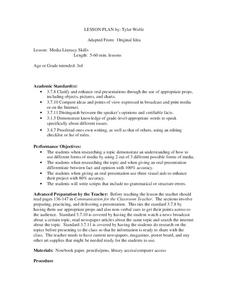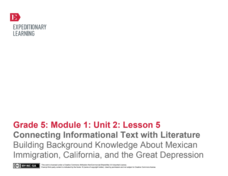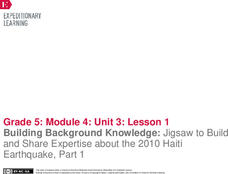Curated OER
Mondrian - Primary/Secondary Color Study
Utilizing computer software, learners demonstrate the color spectrum. They investigate the life of the artist Piet Mondrian and define his style of artwork. Then they use Photoshop to recreate some of his designs while discovering the...
Curated OER
Christopher Columbus: The Man, the Myth, the Legend
Learn more about maps by examining Christopher Columbus's voyage to the New World. Kindergartners will learn about basic map skills and how to identify the compass rose, oceans, and land masses. They will also discover the purpose of...
Curated OER
Geography and Culture of China
Take out a map, a paper, a ruler, and those coveted colored pencils for a lesson plan on Chinese culture and geography. This is a multifaceted approach to basic geography skills that incorporate story telling, class discussion, primary...
Curated OER
Justice for All
A reading of Roald Dahl’s Lamb to the Slaughter opens a discussion of justice and fairness. Using a Venn diagram and an Idea Wheel graphic organizer, class members consider the similarities and differences in these two terms. They then...
EngageNY
Building Background Knowledge: The Internment of Japanese-Americans during WWII, Part 1
It is all in the details. Scholars read The Life of Miné Okubo and pay special attention to details that reveal Okubo's character. Completing their Understanding Miné: Character Traits graphic organizers and recalling the descriptions...
Forum
A Research Toolkit of 12 Reading Strategies for the Foreign Language Classroom
Learning to read is not a simple task, but there are methods for assisting pupils as they develop literacy skills. The first four pages of this resource include information about language development and reading development, as well as...
Curated OER
Media Literacy Skills
You're on camera! Third graders find a news story and research it to get more information. Everyone uses their found information to write a script and create their own news broadcast!
Curated OER
Life Skills: Employment Application
I used to hate filling out job applications when I was younger. Make a tedious task painless for your job-minded upper graders. They practice their written communication skills and get ready to search for employment by filling out...
Curated OER
Size It Up: Map Skills
Compare information from a US population cartogram and a standard US map. Learners draw conclusions about population density by analyzing census data a population distribution. They discover that census data is used to apportion seats in...
Curated OER
Improving Elementary Reading Literacy
Students enhance their literary skills through phonemic awareness. In this reading development lesson, students read several storybooks and analyze the phonetics, vocabulary, and overall story. The students then rewrite what they have...
Street Law
The Challenge of Selecting an Ideal Supreme Court Nominee
Nearly every president has had the opportunity to name a nominee to the United States Supreme Court. But what makes someone an ideal candidate to become a Supreme Court justice? High schoolers test their prior knowledge about the Supreme...
Cornell University
Fibers, Dyes, and the Environment
Nanofibers can be made through electrospinning or force spinning in order to reduce the negative impact on the environment. Pupils study the role of fibers and dye on the environment through a series of five hands-on activities. Then,...
Curated OER
Comprehension Skills: Evaluate Using Fiction Stories and Aesop's Fables
Primary readers investigate several comprehension skills in the ten lessons of this unit. Forming opinions about stories, comparing stories to each other, using Venn Diagrams, and applying the ideas from a story to real life situations...
EngageNY
Building Background Knowledge: Why Do Workers Strike? (Chapter 11: "Los Aguacates/Avocados")
Make connections between Esperanza Rising and human rights with the activities outlined here. The instructional activity starts out with a brief quiz and review of the novel. After that, pupils circulate and share quote strips that you...
Curated OER
Understanding Library Skills: The Dewey Decimal System
Cyber Dewey? Dewey Made Fun? Do the Dewey Game? After a librarian-led tour of the school library and an explanation of the Dewey Decimal System, class members use the Internet to access MAGNOLIA, a site with resources devoted to library...
EngageNY
Connecting Informational Text with Litearature: Building Background Knowledge About Mexican Immigration, California, and the Great Depression
Help your class transition as the setting in the novel Esperanza Rising, by Pam Muñoz Ryan, moves from Mexico to California. Beginning with prior knowledge, and moving into jigsaw research groups, class members add to and create posters...
EngageNY
Building Background Knowledge: Competing Views Regarding Mining on Inuit Lands
Scholars build background knowledge about mining on Inuit lands. Working in small groups, they sort information about the Inuit onto a point of view chart to determine if mining is beneficial to Inuit communities.
EngageNY
Building Background Knowledge: Jigsaw to Build and Share Expertise about the 2010 Haiti Earthquake, Part 1
Using the Jigsaw protocol, scholars study chunks of text from a speech given by former US presidents following a devastating 2010 earthquake in Haiti. As they read the speech in small groups, they build background knowledge and share...
Curated OER
Compare and Contrast Knowledge of Vietnam War
Kids compare and contrast knowledge of the Vietnam War. They consider what they know and how their knowledge has changed after listening to oral histories from the war. They compare the understanding of the war from the perspective of...
Chicago Botanic Garden
Accessing Prior Knowledge: Global Climate Change Survey
Begin a unit on weather and climate change by assessing prior knowledge of the topic. Learners respond to a survey with questions that ask what they think causes climate change, the effects of climate change, and if it is important to...
College Board
Civic Knowledge and Action in AP U.S. Government and Politics
Vote, it's your civic duty! The high school lesson focuses on voter turnout and civic participation with a series of activities. Young scholars analyze data to discover voter turnout trends, complete worksheets, and participate in group...
Southern Nevada Regional Professional Development Program
Focus: The Paideia Seminar
Compelling discussions are the result of open-ended, challenging questions. An introduction to Paideia discussions includes explicit directions about how to prepare readers and how to model the kinds of questions they should develop in...
EngageNY
Using Multiple Resources of Information: Creating a Cascading Consequences Chart about DDT and Practicing a Fishbowl Discussion
For every action there is a consequence. Scholars continue their work on creating a cascading consequence chart about DDT using Welcome Back, The Exterminator, Rachel Carson: Sounding the Alarm on Pollution along with graphic organizers...
Curated OER
Digestion & Nutrition: a Case Study
Students explore digestion/nutrition and utilize scientific investigation skills. They complete meal logs for several days and graph their results. After analyzing their data, they write formal lab reports.

























